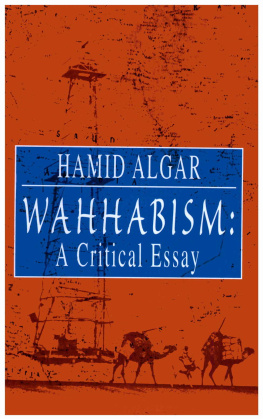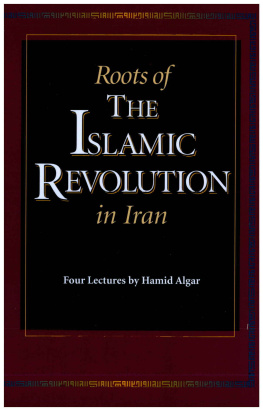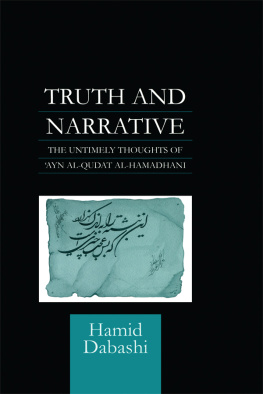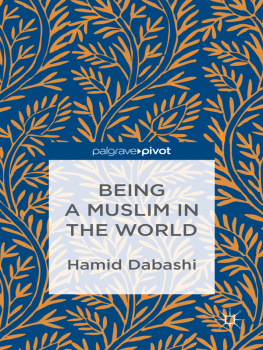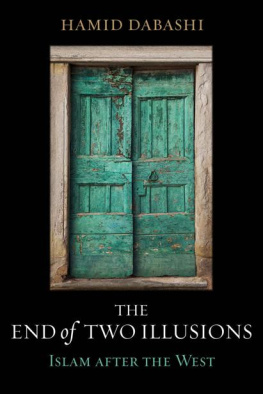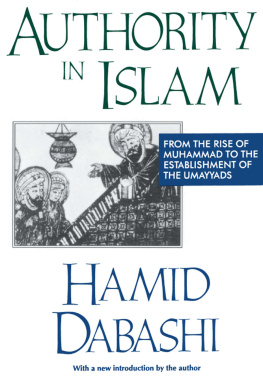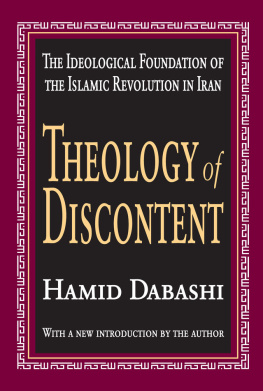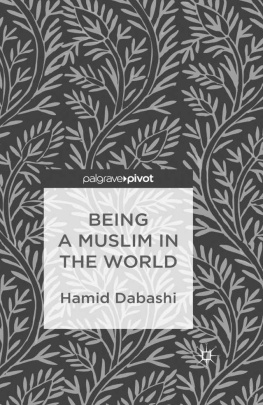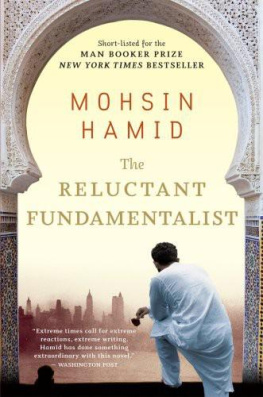Hamid Algar - Wahhabism: A Critical Essay
Here you can read online Hamid Algar - Wahhabism: A Critical Essay full text of the book (entire story) in english for free. Download pdf and epub, get meaning, cover and reviews about this ebook. year: 2015, publisher: BookBaby, genre: Religion. Description of the work, (preface) as well as reviews are available. Best literature library LitArk.com created for fans of good reading and offers a wide selection of genres:
Romance novel
Science fiction
Adventure
Detective
Science
History
Home and family
Prose
Art
Politics
Computer
Non-fiction
Religion
Business
Children
Humor
Choose a favorite category and find really read worthwhile books. Enjoy immersion in the world of imagination, feel the emotions of the characters or learn something new for yourself, make an fascinating discovery.
- Book:Wahhabism: A Critical Essay
- Author:
- Publisher:BookBaby
- Genre:
- Year:2015
- Rating:3 / 5
- Favourites:Add to favourites
- Your mark:
- 60
- 1
- 2
- 3
- 4
- 5
Wahhabism: A Critical Essay: summary, description and annotation
We offer to read an annotation, description, summary or preface (depends on what the author of the book "Wahhabism: A Critical Essay" wrote himself). If you haven't found the necessary information about the book — write in the comments, we will try to find it.
Wahhabism: A Critical Essay — read online for free the complete book (whole text) full work
Below is the text of the book, divided by pages. System saving the place of the last page read, allows you to conveniently read the book "Wahhabism: A Critical Essay" online for free, without having to search again every time where you left off. Put a bookmark, and you can go to the page where you finished reading at any time.
Font size:
Interval:
Bookmark:


Published and distributed by
Islamic Publications International
P.O Box 705, Oneonta, NY 13820. USA
Telephone: 800-568-9814 Fax: 800-466-8111
Email: Islampub@Islampub.com
Copyright 2002 by Islamic Publications International
Printed in the United States of America
All right reserved under international and Pan-American Copyright Conventions. No part of this publication may be reproduced by any form, or by any means electronic or mechanical, including photocopy, recording of any information storage and retrieval system, now known or to be invented without the written permission of the publisher.
First Edition 2002
Algar, Hamid
Wahhabism: A Critical Essay/
by Hamid Algar1 st. ed.
p. cm.
Includes bibliographical references and index.
LCCN: 2001097497
ISBN: 1-889999-13-X (paperback)
ISBN: 1-889999-31-8 (hardback)
ISBN: 9781483557052
1. WahhabismHistory.
2. WahhabismDoctrines. I. Title
BP195.W2A44 2001 297.814
QBI01-201414
Director of Publications: Moin Shaikh
Cover Design: Habibur Rahman (Bounce Media) bounce@tm.net.my
Indexer: Katherine Jensen
Book Composition & Layout: David Van Ness
CONTENTS
WAHHABISM:
A Critical Essay
I
W hat follows is a modest survey of the history, the doctrines, and the contemporary significance of Wahhabism. Persons sympathetic to the teachings we call here Wahhabism might, of course, object to this designation, for it is a title given to the movement by those standing outside of it, often with pejorative intent. Wahhabis themselves prefer the titles al-Muwahhidun or Ahl al-Tauhid, the asserters of the divine unity. But precisely this self-awarded title springs from a desire to lay exclusive claim to the principle of tauhid that is the foundation of Islam itself; it implies a dismissal of all other Muslims as tainted by shirk. There is no reason to acquiesce in this assumption of a monopoly, and because the movement in question was ultimately the work of one man, Muhammad b. Abd al-Wahhab, it is reasonable as well as conventional to speak of Wahhabism and Wahhabis.
Two other preliminary remarks. First, in the extremely lengthy and rich history of Islamic thought, Wahhabism does not occupy a particularly important place. Intellectually marginal, the Wahhabi movement had the good fortune to emerge in the Arabian Peninsula (albeit in Najd, a relatively remote part of the peninsula) and thus in the proximity of the Haramayn, a major geographical focus of the Muslim world; and its Saudi patrons had the good fortune, in the twentieth century, to acquire massive oil wealth, a portion of which has been used in attempts to propagate Wahhabism in the Muslim world and beyond. In the absence of these two factors, Wahhabism might well have passed into history as a marginal and shortlived sectarian movement. Those same two factors, reinforced by a partial congruity with other contemporary tendencies in the Islamic world, have endowed Wahhabism with a degree of longevity.
Second, Wahhabism is an entirely specific phenomenon, calling for recognition as a separate school of thought or even as a sect of its own. Sometimes the Wahhabis are characterized, particularly by non-Muslim observers searching for a brief description, as extreme or as conservative Sunnis, with adjectives such as stern or austere added for good measure. It has, however, been observed by knowledgeable Sunnis since the earliest times that the Wahhabis do not count as part of the Ahl al-Sunna wa al-Jamaa, for almost all the practices, traditions and beliefs denounced by Muhammad b. Abd al-Wahhab have been historically integral to Sunni Islam, enshrined in a vast body of literature and accepted by the great majority of Muslims. Precisely for that reason, many of the ulama contemporary with the first emergence of Wahhabism denounced its followers as standing outside the pale of Ahl al-Sunna wa al-Jamaa. That Wahhabis are now counted as Sunni is one indication that the term Sunni has come to acquire an extraordinarily loose meaning, not extending much beyond recognition of the legitimacy of the first four caliphs (regarded by Sunnis as the Khulafa al-Rashidun [the Rightly Guided Caliphs]); in fact, it signifies little more than non-Shii. Our characterization of Wahhabis as non-Sunni is therefore above all a historical clarification; it has in itself no polemical purpose, if only because for the present writer Sunnism is but one representation and interpretation of Islam.
Another general notion concerning Wahhabism fixed in the minds of many Muslims is that it stood at the origin of a series of reform movements which in some cases are still active in the Muslim world. Thus it is imagined that a direct line of descent led from the Wahhabis in Arabia first to Jamal al-Din al-Afghani, Muhammad Abduh, and Rashid Rida, and from them to the Muslim Brotherhood (al-Ikhwan al-Muslimun)in short, to the conglomeration of persons and movements known as the Salafiyya. There are, indeed, points held in common by Wahhabis and Salafis, as will be discussed later in this essay, and it was not entirely by accident that from the 1960s onwards many activists of the Ikhwan chose Saudi Arabia as their place of refuge from persecution by Abd al-Nasir. There is, however, no genetic connection between Wahhabism and movements that subsequently arose in the Muslim world. The relative prevalence of Wahhabi modes of thought now observable in various Muslim countries is a more recent phenomenon, due to a variety of contingencies unconnected with the first appearance of that sect. A related error is to think of Wahhabism as having been from the time of its origin a reform movement that found a widespread and sympathetic echo in the Muslim world, or that it conformed to a general pattern of renewal (tajdid) then underway in the Middle East, in South Asia, in Africa and elsewhere. All those movements were largely different in their nature from Wahhabism, which must be regarded within the specific context of its own time as an exception, an aberration, or at best an anomaly.
II
M uhammad b. Abd al-Wahhab was born in 1115/1703 in the small town of al-Uyayna in Najd in the eastern part of what is today called the Kingdom of Saudi Arabia. Najd had not been notable in Islamic tradition for scholarship or movements of spiritual renewal; its topographical barrenness seems always to have been reflected in its intellectual history. There are, indeed, indications in hadith that as a recipient of divine blessing Najd compares unfavorably with such regions as Syria and Yemen, and that it is there that disturbances and disorder and the generation of Satan (al-zalazil wa l-fitan wa qarn al-shaytan) will arise. Correlating apocalyptic hadith with observable historical phenomena is a hazardous task, best left unattempted, and this particular hadith, if indeed authentic, may ultimately be seen to have a sense entirely However, its occurrence in the hadith literature does convey a sense of foreboding with respect to this part of the Arabian peninsula and suggest that any movement originating there should be viewed with great caution.
Muhammad b. Abd al-Wahhabs father and first teacher was the qadi of al-Uyayna, who exercized the office in accordance with the Hanbali madhhab that was traditionally prevalent in the area. Uthman b. Abdullah b. Bishr, author of a standard Saudi chronicle, writes concerning the early years of Muhammad b. Abd al-Wahhab that God Almighty expanded his breast for him, enabling him to understand those contradictory matters that lead men astray from His path. He therefore joined his father in Huraymila before leaving for the Hijaz, initially to perform the Hajj.
Next pageFont size:
Interval:
Bookmark:
Similar books «Wahhabism: A Critical Essay»
Look at similar books to Wahhabism: A Critical Essay. We have selected literature similar in name and meaning in the hope of providing readers with more options to find new, interesting, not yet read works.
Discussion, reviews of the book Wahhabism: A Critical Essay and just readers' own opinions. Leave your comments, write what you think about the work, its meaning or the main characters. Specify what exactly you liked and what you didn't like, and why you think so.

